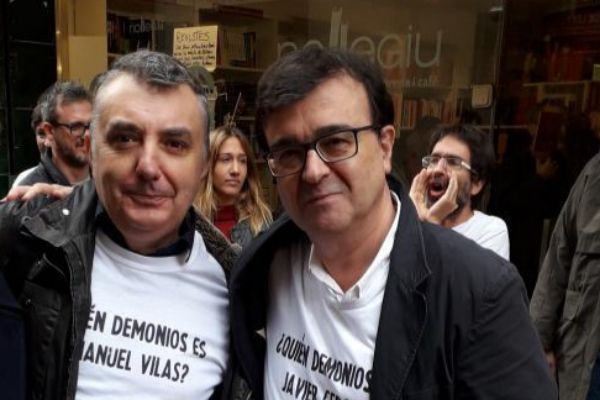Javier Cercas and Manuel Vilas, two heavyweights of Spanish literature, were crowned last night in a Barcelona still on alert for protests over the sentence with the Planeta Prize, the award best endowed with Spanish letters. After a few years in which the prize had turned towards proposals of gender and undoubted commercial hook, the jury, composed of Alberto Blecua, Fernando Delgado, Juan Eslava Galán, Pere Gimferrer, Carmen Posadas, Rosa Regás and Belén López, opted for two first Swords of the literature of our country that enjoy a rare combination: great public success and recognition of the most demanding criticism.
Javier Cercas took the 600,100 euros of the main prize with a manuscript entitled Broken glass presented under the pseudonym Melchor Marín. Terra Alta , that will be the title of the novel when the first week of November arrives at bookstores, is inspired by the story of the mosso d'esquadra who involuntarily became a hero in the attacks of Cambrils of the summer of 2017, in the that four armed jihadists intended to cause a massacre on the seafront after the attack on the Ramblas in Barcelona, perpetrated a few hours earlier. The aftermath of the event and the climate of tension that Catalonia experienced that summer, with the process about to explode shortly after, are the background landscape. The plot is divided into two: on the one hand the story of a marriage is told and, on the other, there is the complicated resolution of a triple murder by the mosso in the Tarragona town of Gandesa, the capital of the Terra Alta region.
Cercas, born in Ibahernando (Cáceres) in 1962, although Girona from adoption since the age of four, has been characterized as a very critical voice with nationalism and identity drift in Catalonia. Reality usually leaks into his work. From the bestselling Soldiers of Salamis (on an episode of the Civil War) to Anatomy of an instant (the intrahistory of the failed coup d'etat of 23-F) or The imposter (inspired by the figure of Enric Marco Batlle, who was posing as survivor of a Nazi concentration camp), the most relevant facts of the recent Spanish history have served as inspiration in most of his work.
Manuel Vilas (Barbastro, Huesca, of the same fifth as Cercas) was a finalist and took home the 150,250 euros of the prize with Alegría. Vilas chose the name of Viveca Lindfords, a usual Swedish actor in fantasy and horror movies with a small role in As we were to camouflage his authorship and his manuscript was named after Rob Reiner's classic. The many readers of his latest work, Ordesa , considered by critics as one of the best books of the past year and also blessed by the public with 100,000 copies sold, will find in Alegría a kind of continuation. If in Ordesa Vilas she traced a kind of autobiography in which she remembered her childhood and her relationship with her parents in a brutally tender, lyrical and wildly stark manner, in Alegría she continues to explore the passing of the years after the death of her parents. The protagonist is a middle-aged man tormented by demons and touched by depression that, somehow, manages to make his way gradually towards happiness.
Neither Cercas nor Vilas, two of the most powerful names in Spanish literature, were authors of Planeta until last night. Both published for years on different labels - Random House Literacy in the case of the first and Alfaguara in the second - belonging to Penguin Random House, the only other large group in Spain capable of competing with a giant like Planet. So the double operation is interpreted as a coup d'etat by Planeta, which turns 70 this year, on its most direct competitor in Spain, which in recent months had initiated a strategy to buy other stamps of smaller size, such as the Last great independent publisher, Salamandra. Sources of the group took away iron to the subject ("It is something that happens every day") and it is true that the fact that an author jumps to another publishing house is habitual. What is not so much is that the robbery is double, with a media speaker of the caliber of the Planet and that affects the most grenade of the rival literary team. Seventy years are not met every day.
According to the criteria of The Trust Project
Know more- literature
- Planet Award
- culture
LiteratureFive things to know about the Nobel Prize for Literature: from Salman Rushdie's case to gifts to academics
Literature Aurora Luque wins the XXXII Loewe Prize for Poetry
LiteratureMario Vargas Llosa: "We must investigate to lie with knowledge of cause"

